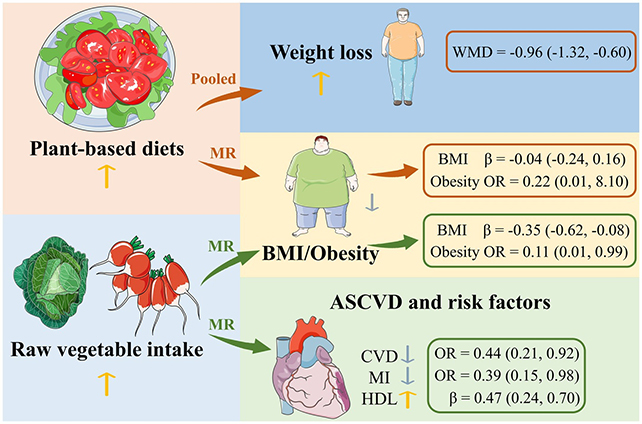The hints keep stacking up. Yet another review has found plant-based diets are associated with better long-term health, this time specifically around weight loss and prevention of heart disease.
What's more, Qilu Hospital of Shandong University medical researcher Yani Xu and colleagues found the consumption of raw vegetables may play a large role in these outcomes.
"Obesity and its associated complications not only lead to increased morbidity and mortality, but also to a reduced quality of life," write Xu and team in their paper.
"A plant-based diet is a viable option for people who want to control their body weight and improve the quality of their diet to prevent and treat metabolic diseases."

From healthier cholesterol levels, hearts, brains, bowels, and immune systems, to greater longevity in general, studies keep finding these strong associations between vegetarian and vegan diets with reduced risks of major diseases.
While this doesn't mean we should all immediately swear off meat, it does imply reducing meat where possible can have a powerfully positive impact on our health.
Searching through past scientific literature, Xu and team found 24 studies exploring the relationship between plant-based diets and weight loss. Pooled data from the studies provided details on 2,223 people between the ages of 18 to 82, with durations of the diets studied varying from two to 96 weeks.
The review indicates the positive impacts of plant based diets increase over time, explain Xu and colleagues. While those on strictly vegan diets lost the most weight, it was not significantly more than the participants who still consumed dairy and eggs.
But the studies that involved an increased consumption of raw vegetables seemed to support the strongest links to a lower risk of obesity and heart problems, the researchers found.

Even randomized controlled trials like these can't determine whether eating raw vegetables directly causes our health to improve, so the researchers included a second analysis based on Mendelian randomization – a process better suited to identifying cause and effect on matters of health.
Sifting through a public database of entire genomes, the team selected genetic variants that could be statistically associated with factors like plant-based diets, vegetable consumption, and adverse health outcomes. From this, the Mendelian randomization analysis determined eating more raw vegetables was more likely to be responsible for their weight loss than genetic factors.
"Raw vegetables contain phytosterols and unsaturated fats that lower blood cholesterol concentrations," Xu and team explain in their review. "They also contain various substances (e.g., tocopherols, ascorbate, carotenoids, saponins, and flavonoids) that can reduce inflammation and oxidative stress, thereby reducing the risk of cardiovascular disease."
Increasing the amount of raw vegetables we eat may be a good way to improve our health, but it's important to keep in mind that taking a raw plant-based strategy too far can lead to health problems as well. Vegetarian diets can lead to nutrient deficiencies if not planned correctly.
For example, B12 is easier to obtain from animal products and low levels can cause mouth ulcers, jaundice, vision problems, depression, and other mood problems. Vegetarianism can be extremely difficult for those of us with dietary health conditions to achieve as well.
For these reasons researchers often emphasize that including more vegetables in your diet, rather than becoming strictly vegan, is the most important takeaway from all these studies.
This review was published in Frontiers in Nutrition.
